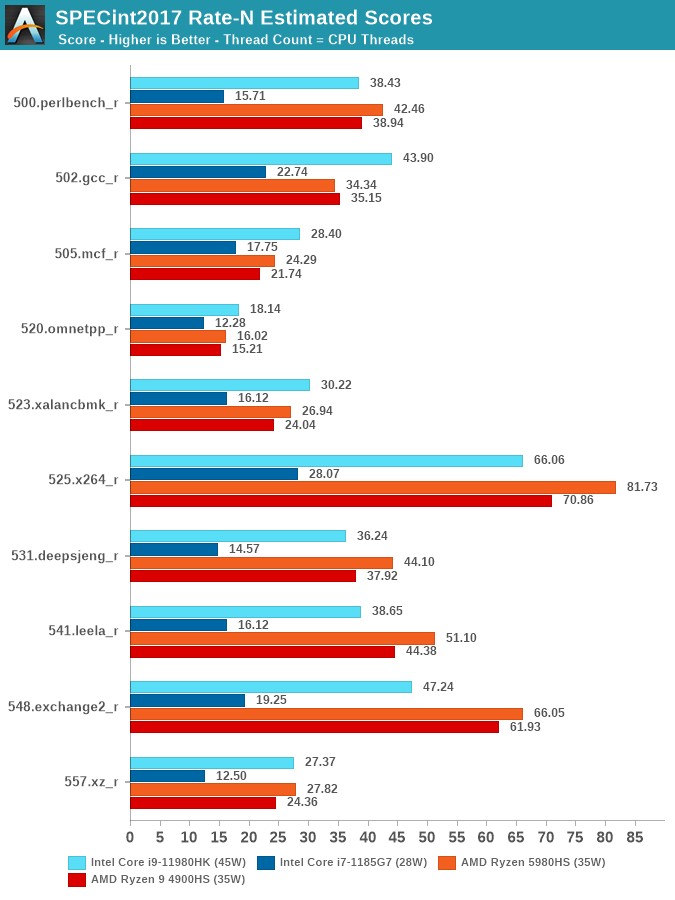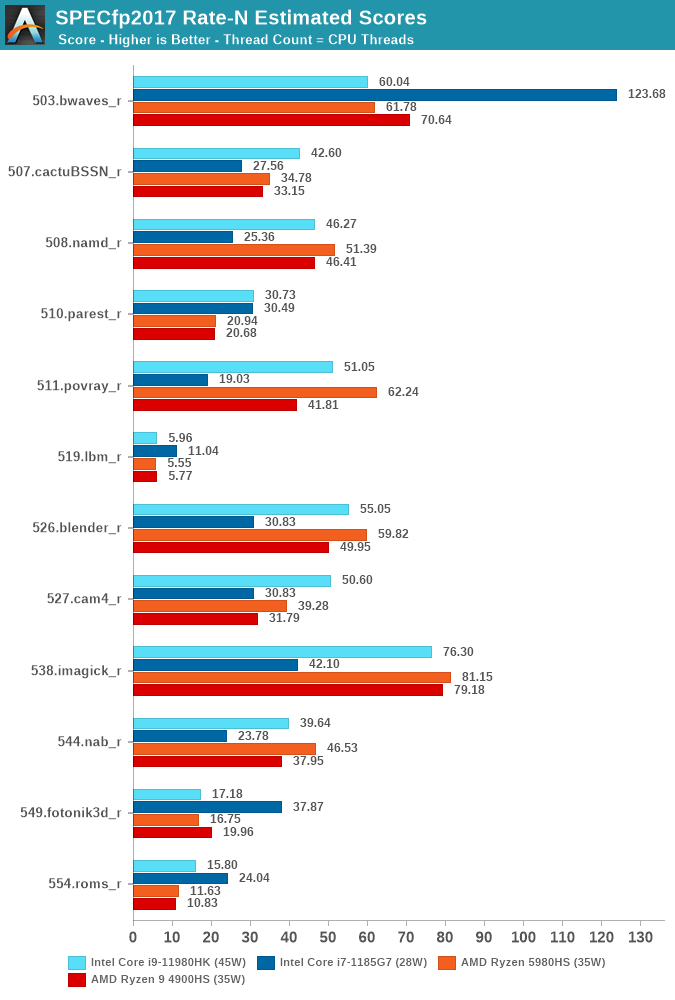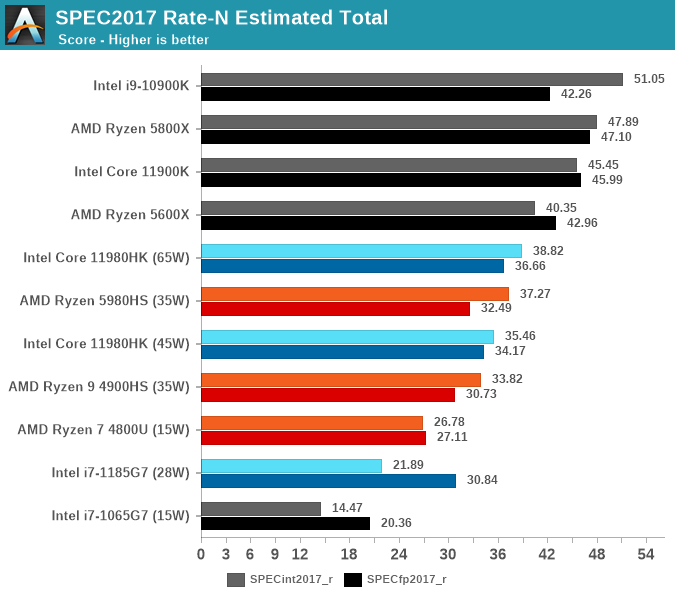Intel 11th Generation Core Tiger Lake-H Performance Review: Fast and Power Hungry
by Brett Howse & Andrei Frumusanu on May 17, 2021 9:00 AM EST- Posted in
- CPUs
- Intel
- 10nm
- Willow Cove
- SuperFin
- 11th Gen
- Tiger Lake-H
SPEC CPU - Multi-Threaded Performance
Moving onto multi-threaded SPEC CPU 2017 results, these are the same workloads as on the single-threaded test (we purposefully avoid Speed variants of the workloads in ST tests). The key to performance here is not only microarchitecture or core count, but the overall power efficiency of the system and the levels of performance we can fit into the thermal envelope of the device we’re testing.
It’s to be noted that among the four chips I put into the graph, the i9-11980HK is the only one at a 45W TDP, while the AMD competition lands in at 35W, and the i7-1185G7 comes at a lower 28W. The test takes several hours of runtime (6 hours for this TGL-H SKU) and is under constant full load, so lower duration boost mechanisms don’t come into play here.

Generally as expected, the 8-core TGL-H chip leaves the 4-core TGL-U sibling in the dust, in many cases showcasing well over double the performance. The i9-11980HK also fares extremely well against the AMD competition in workloads which are more DRAM or cache heavy, however falls behind in other workloads which are more core-local and execution throughput bound. Generally that’d be a fair even battle argument between the designs, if it weren’t for the fact that the AMD systems are running at 23% lower TDPs.

In the floating-point multi-threaded suite, we again see a similar competitive scenario where the TGL-H system battles against the best Cezanne and Renoir chips.
What’s rather odd here in the results is 503.bwaves_r and 549.fotonik_r which perform far below the numbers which we were able to measure on the TGL-U system. I think what’s happening here is that we’re hitting DRAM memory-level parallelism limits, with the smaller TGL-U system and its 8x16b LPDDR4 channel memory configuration allowing for more parallel transactions as the 2x64b DDR4 channels on the TGL-H system.

In terms of the overall performance, the 45W 11980HK actually ends up losing to AMD’s Ryzen 5980HS even with 10W more TDP headroom, at least in the integer suite.
We also had initially run the suite in 65W mode, the results here aren’t very good at all, especially when comparing it to the 45W results. For +40-44% TDP, the i9-11980HK in Intel’s reference laptop only performs +9.4% better. It’s likely here that this is due to the aforementioned heavy thermal throttling the system has to fall to, with long periods of time at 35W state, which pulls down the performance well below the expected figures. I have to be explicit here that these 65W results are not representative of the full real 65W performance capabilities of the 11980HK – just that of this particular thermal solution within this Intel reference design.










229 Comments
View All Comments
Andrei Frumusanu - Monday, May 17, 2021 - link
As a note, we're just finishing up this review at the very last minute due to us getting our hands on the reference laptop only in the last 48h. I'll be completing the missing page texts in the next few hours as we're tidying up the article.EliteRetard - Monday, May 17, 2021 - link
Did you have a description/specs of the test systems?If it was there I missed it, even after going back to look.
Differences in RAM / storage etc. can affect some tests.
I'm guessing the size based on the name of the Asus...
Looks like you're comparing a 16" workstation vs a 13" thin/light?
Would the AMD CPU perform better in a larger/cooler chassis?
timecop1818 - Tuesday, May 18, 2021 - link
> Would the AMD CPU perform betterlol
Spunjji - Tuesday, May 18, 2021 - link
> timecop1818lol
Qasar - Tuesday, May 18, 2021 - link
gotta love timecrap181...at_clucks - Wednesday, May 19, 2021 - link
Come on, the Intel CPU actually performs decently... for a slowish desktop CPU stuck in a laptop chassis. Still not that bad.Spunjji - Thursday, May 20, 2021 - link
It performs very well, but timcarp1488 was completely misreading what had actually been said just to shitpost his usual anti-AMD nonsense.Spunjji - Tuesday, May 18, 2021 - link
"Did you have a description/specs of the test systems?"A brief description of the Intel reference system is in this review, more detail of the AMD system is available in the review these test results came from.
"Would the AMD CPU perform better in a larger/cooler chassis?"
A 45W variant of the AMD CPU in a larger chassis would see higher sustained multi-core performance, but single-core is probably quite similar.
Gondalf - Wednesday, May 19, 2021 - link
Strange article Andrei.5980HS is rated 35-54 W or 45W+. How can you judge that 45W Intel is less efficient?? Have you data about TDP settings of Asus X13 ? Likely the AMD SKU run at the highest TDP for more performance on Asus device, for several minutes or continuously.
Bet you neeed to be more informed in your articles, OEMs can go at the max TDP of a cpu since the Tskin of the laptop allow this.
Bet Intel Tiger Lake H will be faster than in your article on the right chassis ?
Bet direct power measures are better than generic comments ?
Retycint - Thursday, May 20, 2021 - link
Strange comment Gondalf.The graph of the 5980HS on page 2 shows that the Asus X13 runs at 42W for about 300s and then drops to 35W for the rest of the time.
Bet you didn't read the article and just came down instantly to try and feel smug?
Bet you need to be more informed when making hate posts?